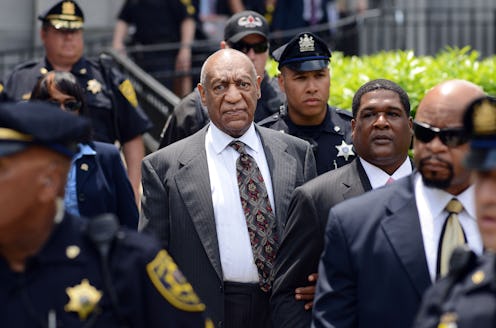News
What The Bill Cosby Trial Is About
At the height of his career in the late '80s, Bill Cosby was largely beloved as America's favorite TV dad. But these days, allegations of sexual assault from nearly 60 women — which Cosby and his legal team has vehemently denied — have cast a gray cloud over the comedian's later years. Last week, in a preliminary hearing, a Pennsylvania judge ruled there was enough evidence to charge Cosby with three counts of felony aggravated indecent assault. Although dozens of women have spoken out against the entertainer, this is the first time he has faced a criminal charge, but what exactly is the Bill Cosby trial about?
The entertainer will stand trial on charges of allegedly drugging and sexually assaulting Andrea Constand, a former employee of Cosby's alma mater Temple University, whom the comedian mentored approximately 12 years ago. In December, roughly 10 years after Constand first went to police and just a few days before the statute of limitations deadline was set to run out, Cosby was charged by Montgomery County District Attorney Kevin Steele on three counts of aggravated indecent assault stemming from allegations Constand had made in 2005.
Constand, now 43, claims she was drugged and molested by the 78-year-old actor in 2004 at his home in Elkins Park, Pennsylvania. Cosby, however, has maintained he had only consensual sexual relations with Constand, that she never said "no," and that the only drug he ever gave her was Benadryl.
In a statement Constand gave police in 2005, she claimed she allegedly went "in and out" of consciousness after taking pills Cosby had offered her. Constand told police she "was unable to speak" and thus could not tell Cosby "no" as the comedian allegedly fondled her breasts and genitals. Cosby admitted to "petting and the touching of private parts" in a statement he provided police shortly after Constand reported the event but denied allegations the activity was not consensual.
In court Tuesday, Cosby's defense team argued there were inconsistencies in Constand's statement and that the two had other consensual sexual encounters as Constand maintained a relationship with Cosby for approximately a year after the alleged incident took place. In denying Cosby's claims of consensual "petting," Constand filed court documents last July in which she said she was a lesbian, Reuters reported.
When Constand first reported the incident to police in 2005, prosecutors reportedly decided not to pursue a case against Cosby due to "insufficient, admissible, and reliable evidence upon which to base a conviction beyond a reasonable doubt," former Montgomery County prosecutor Bruce Castor told NBC10 in 2014. "As much as I wanted to go forward, there wasn't enough evidence and prosecutors are bound by the law." In 2006, Constand and Cosby settled a civil suit the woman had filed against the entertainer.
Cosby's lawyers had been trying to have the charges against the comedian dismissed since he was first charged in December, claiming "there was no evidence of a crime" as much of the case involves hearsay. The prosecution claims Constand would not have been able to provide consent after being drugged and argues that recently unsealed depositions Cosby made in 2005 and 2006 provide evidence of "prior bad acts."
Cosby could face up to 10 years in prison for each charge if convicted.
